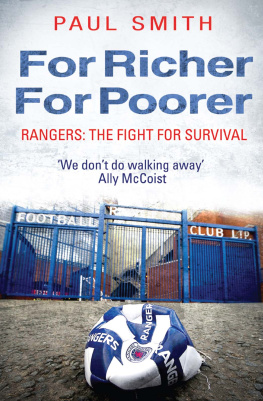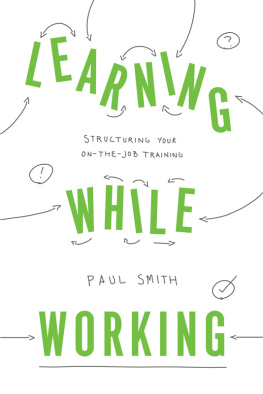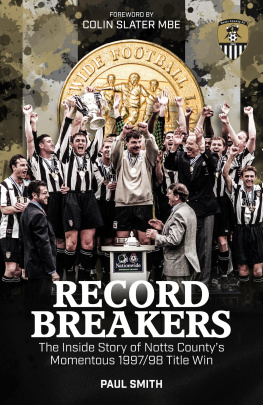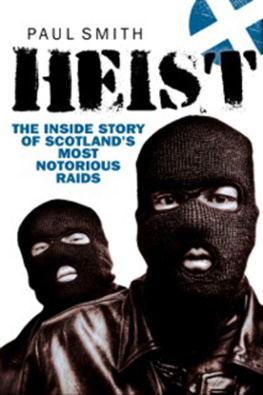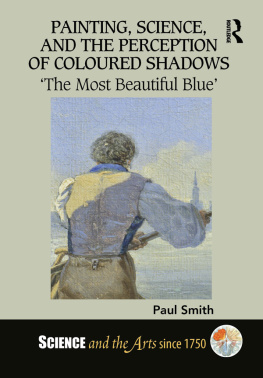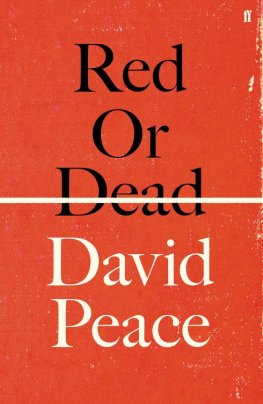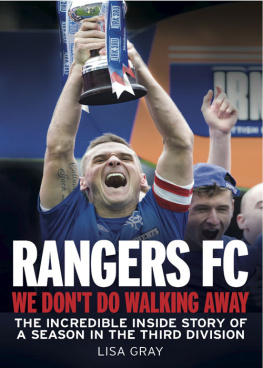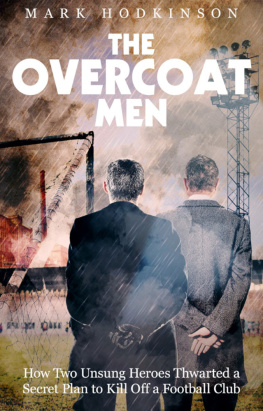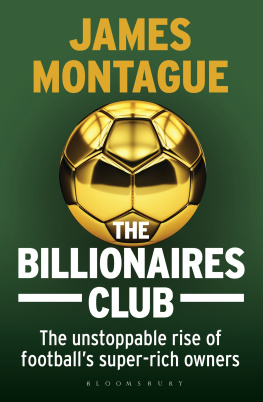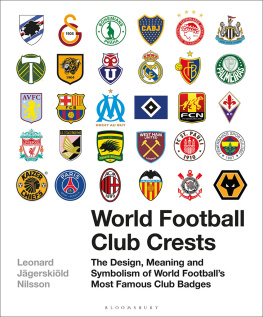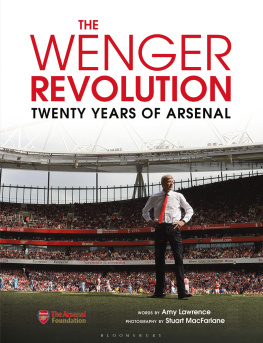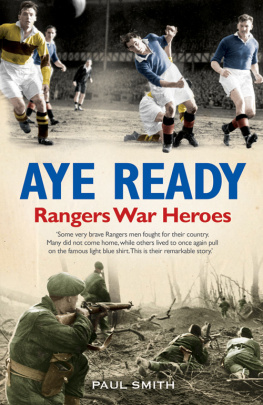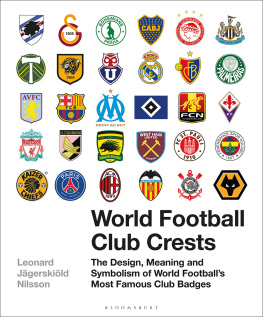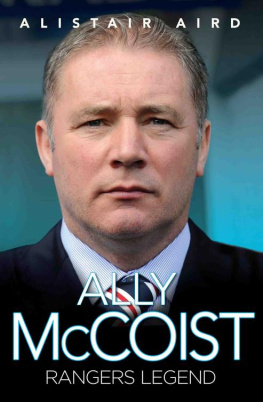Table of Contents
About the Author
Paul Smith has been working as a journalist in the Scottish national, regional and local press for more than 15 years, covering news and sport. As an author, he has penned a series of football titles, including To Barcelona and Beyond: The Men Who Lived Rangers European Dream, Shooting Star: The Colin Stein Story and Rangers Cult Heroes. He lives in Kintore, Aberdeenshire, and is the son of former Rangers and Scotland player David Smith.
FOR RICHER, FOR POORER
Rangers: The Fight for Survival
Paul Smith

To Coral, Finlay, Mia and Zara
ACKNOWLEDGEMENTS
WHAT WAS ALREADY a complex subject became far more complicated along the way as events at Ibrox snowballed and the process of administration began. The final chapter in this story has certainly not been written, but the tale up to this point could not have been told without the help of many people. My thanks go to Bill Campbell, Graeme Blaikie, Claire Rose and the rest of the team at Mainstream for their patience, support and incredible attention to detail in an ever-changing project that must surely be unlike any other. Colin MacLeod too provided his valued input, not to mention encouragement, along the way, while Eric McCowats imagery fits the story perfectly. I also owe a debt of gratitude to a long list of people who spared their time to contribute, both on and off the record, and offer valuable insights into the workings of Rangers Football Club and the men at the top. Those include Gordon Smith, Lorenzo Amoruso, Mel Stein, Mark Dingwall, George Adams, Mike Wilson, Freddie Fletcher, Ian Broadley and, in the calm before the storm of administration and the revelations it brought, Craig Whyte himself. Many others, who preferred not to be named, also lent their support and expertise to give a flavour of life at the club. Closer to home, as ever my eternal thanks go to Team Smith Coral, Finlay, Mia and Zara for the love and laughter thats behind everything I do.
INTRODUCTION
We dont do walking away.
Ally McCoist, 2012
FOR RICHER, FOR poorer, for better, for worse. Three men had served as owner of Rangers prior to the dramatic events of February 2012, and that trio share one common bond none was chosen by the supporters who are the lifeblood of the football club. In almost every other way, Lawrence Marlborough, David Murray and Craig Whyte are very different men, and each of their tenures has been marked by very different decisions.
Marlborough can be remembered as a revolutionary. He was the man who took Rangers into single ownership for the first time in the clubs history and recruited Graeme Souness to lay the foundations for the success that followed. Then, in the blink of an eye, he was gone, set sail for foreign shores, never to reappear in the limelight and never to show any tangible interest in the club again.
Murray will always be revered as the chairman who delivered nine in a row, who broke down barriers and who dared to dream. His was ambition with a capital A. Realistically, he will also be remembered for allowing debt to spiral and for the painful end to his reign, with the decision to hand over to a man subsequently deemed not fit and proper. His stay in the chairmans seat was far longer than those of his predecessor and his successor but his departure was protracted too.
Whyte will forever be known as the man who was in charge when one of the worlds great sporting institutions was brought to its knees, the individual who had to pick up the phone and call in the administrators. It was on Whytes watch that liquidation first became a real and terrifying prospect, an option that at one stage appeared unthinkable and then became seemingly inevitable.
Whyte had arrived as the master of his own destiny, or so it appeared. He talked the talk and had the opportunity to walk the walk to learn from the experiences of his predecessors and go his own way as he negotiated the winding path of football-club ownership. But it would transpire that the taxman, among others, would have a major say in the outcome of his dalliance with football.
A few whispered their concerns and doubts from the outset, but none could have predicted the next dramatic chapter in the enthralling and captivating story of Rangers following Whytes arrival. The only safe assumption was that the choppy waters of football-club ownership would not allow for plain sailing. One minute, you are riding high on the crest of a wave, the next bailing out water as the swell threatens to swamp you.
Marlborough and Murray went through it, to varying degrees, while Whyte, early in his spell of service, quickly developed a sense of what lay in store as the scrutiny of him and his businesses reached fever pitch even before his fledgling sporting empire crumbled beneath him.
It is like no other role in business and arguably like no other in football: as custodian of the proud history and heritage of Rangers Football Club, there is a burden to be carried. Many men have carried it with pride; in recent years, others have failed to shoulder it at all.
It takes a certain type of personality to cope with the peculiar demands of the job, particularly over a long-term tenure. When the 201213 season kicked off, it would be the 25th campaign since David Murray first took control in 198889. It was an incredible landmark, and although he never quite made it to a quarter of a century not out, there could be no mistaking the momentous changes that took place on Murrays watch.
Think back to 1988, when the deeds were first signed over from Marlborough. Sky Television was just a glint in Rupert Murdochs eye, two years from its launch. Predators were something you found in the jungles of the Amazon, not in the catalogues of Adidas. It was a time when defenders could knock the ball back to their goalkeeper without fear of retribution, with the pass-back law still four years away, and when the Bosman ruling sounded more like a John Grisham thriller than a piece of football legislation.
Away from sport, Labour was still very much Old and Margaret Thatcher showed no sign of losing her grip on the nation. Glasgow was basking in the glory of the citys gala Garden Festival, and Britain was digging deep to support a new charity appeal by the name of Comic Relief. Surely it would never catch on.
Rangers, too, has changed since then. In 1988, Graeme Souness was still a snarling presence at the heart of the team, his team. It was a time when the manager could travel south to sign the biggest and best names in the English game without batting an eyelid, long before the talent drain was reversed. There was no Murray Park and no third tier on the iconic Main Stand. Standing was still permitted; Catholic players were not. All of those things and many more besides changed during the Murray years.
As much as anything, the sea change in almost every aspect of life at the club during Murrays tenure is an illustration of the chairman and owners longevity. He remained at the helm longer than any chairman in the top flight of Scottish football during his era and was on hand to push home his sides dominance. Rangers have not remained at the top of their game for as long as they have, albeit with sporadic dips in form, by accident. The right people have been chosen and left to manage as they see fit, knowing there was a plentiful supply of advice and guidance as and when required. That was Murrays way. His successors was very different with dramatic consequences.
In 1988, there was optimism and there was a sense that anything was possible. Flip forward to the tail end of Murrays nearly 25-year spell in charge and you find a club facing a battle on all fronts. The taxman, creditors, former directors, law firms at times a queue has been forming in a not so orderly manner outside Ibrox, everyone looking for a pound of flesh.
Next page
